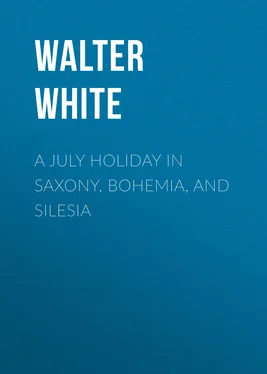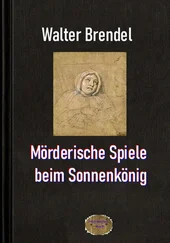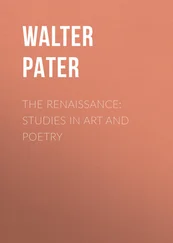Walter White - A July Holiday in Saxony, Bohemia, and Silesia
Здесь есть возможность читать онлайн «Walter White - A July Holiday in Saxony, Bohemia, and Silesia» — ознакомительный отрывок электронной книги совершенно бесплатно, а после прочтения отрывка купить полную версию. В некоторых случаях можно слушать аудио, скачать через торрент в формате fb2 и присутствует краткое содержание. Жанр: Путешествия и география, foreign_antique, на английском языке. Описание произведения, (предисловие) а так же отзывы посетителей доступны на портале библиотеки ЛибКат.
- Название:A July Holiday in Saxony, Bohemia, and Silesia
- Автор:
- Жанр:
- Год:неизвестен
- ISBN:нет данных
- Рейтинг книги:5 / 5. Голосов: 1
-
Избранное:Добавить в избранное
- Отзывы:
-
Ваша оценка:
- 100
- 1
- 2
- 3
- 4
- 5
A July Holiday in Saxony, Bohemia, and Silesia: краткое содержание, описание и аннотация
Предлагаем к чтению аннотацию, описание, краткое содержание или предисловие (зависит от того, что написал сам автор книги «A July Holiday in Saxony, Bohemia, and Silesia»). Если вы не нашли необходимую информацию о книге — напишите в комментариях, мы постараемся отыскать её.
A July Holiday in Saxony, Bohemia, and Silesia — читать онлайн ознакомительный отрывок
Ниже представлен текст книги, разбитый по страницам. Система сохранения места последней прочитанной страницы, позволяет с удобством читать онлайн бесплатно книгу «A July Holiday in Saxony, Bohemia, and Silesia», без необходимости каждый раз заново искать на чём Вы остановились. Поставьте закладку, и сможете в любой момент перейти на страницу, на которой закончили чтение.
Интервал:
Закладка:
Schneeberg, lying in a valley backed by a dark slope of firs, has a singularly gloomy aspect, which disappears as you descend the hill. It was eleven on Sunday morning when I entered the town. Because summer had come, the street lamps were all taken down; but that the chains and ropes might not hang idle, the lamplighter had tied a big stone or large brick, by no means ornamental, to the end of every one. A military band was playing in the market-place; a few shops were open; and a man hurrying from corner to corner was posting up bills of plays to be acted in the evening—a little comedy, followed by a piece in five acts. The prices were, for the first places, 6d., the second, 3d., the third, 2d., which would hardly exclude even the poorest. So, in Saxony, as elsewhere on the Continent, not only Papists but Protestants are willing to recreate themselves with music and the theatre on a Sunday. A half-dozen postilions, who were strutting about in the full blaze of bright-yellow coats, yellow-banded hats, jack-boots, and with a bugle slung from the shoulder, seemed as proud of their dress as the peacocky drum-major did of his.
I ordered a steak at the Fürstenhaus . "Will you have it through-broiled or English-broiled?" asked the waiter, and looked a little surprised at my preference of the former. When the band stopped playing, numbers of the listeners came into the dining-room for a Halbe of beer, and sat down to play at cards.
The church, a spacious edifice, crowns the height above the market-place. After walking twice round it, I discovered a small door in an angle, which being unfastened gave me admittance. The interior, with its worn and uneven brick floor, has somewhat of a neglected look, not unusual in Protestant churches; but there are a few good paintings, and the altar-piece, representing the Crucifixion, shows the hand of a master. I was quite alone, and could explore as I pleased. The altar rises to a great height, adorned with statues, and crowned by figures of angels. Near it two or three tall crucifixes lean against the wall; the font, and a lectern upborne by an angel stand in the centre of the nave, and everywhere are signs of the Lutheran form of worship. Here and there, constructed with an apparent disregard of order, are glazed galleries, pews, and closets, and others that resemble large cages—ugly excrescences, which mar the fair proportions of the lofty nave. The gallery is fronted by a thick breastwork of masonry, bearing a heavy coping, and the brick floor is in many places worn completely through, and the loose lumps are strewn about. The view from the tower, commanding miles of the mountain range, more than repays the trouble of the ascent.
There are three services on the Sunday. From six to seven, and from eight to half-past nine in the morning, and from one to two in the afternoon. The rest of the day is free; but not for work, as in other countries. Haymaking, as I was informed, is the only Sunday work permitted by the law of Saxony. The Sunday school is well attended, and is not confined to religious subjects, for writing, arithmetic, and drawing are taught.
While trudging up the hill beyond the town, I passed one of the springless country wagons, crammed with a military band, the fiddles and big bass viol hanging behind, on the way to amuse the folk at Stein with music. They undertake a similar expedition every Sunday in fine weather to one or other of the surrounding villages.
I met with two novel experiences during the afternoon. One was, that to sit down in the church at Neustädl is a penance, for the pews are so narrow that you have to lift up the hinged seat before you can enter. The other, a few miles farther on the way, was of a surly Wirth , dwelling under the sign of the Weisses Lamm (White Lamb), whom I begged to draw me a glass of beer cool from the cellar. Instead of complying, he filled the measure from a can which had been standing two or three hours on the dresser in all the suffocating heat of the stove, and placed it before me with a grunt. I ventured to remind him, with good-humoured words, that lukewarm beer was not acceptable to a thirsty wayfarer on a hot day; whereupon he retorted, snarling more like a wolf than a lamb, "Either drink that, or go and get other where the pepper grows"— wo der Pfeffer wächst .
The old sinner availed himself of a form of speech much used among the Germans to denote a place of intensely high temperature, and sulphureous withal, in which pepper, being so very pungent a product, may be supposed to grow.
"Suppose you go first," I answered, "and see if there be any left." And turning away, I shut the door upon the snarl which he snarled after me, and went on to Eybenstock, where cool beer in plenty was forthcoming as soon as asked for.
I told the hostess of my adventure with old Surly. "Just like him," she replied, laughing merrily; "nobody ever goes to the White Lamb that can help it. You didn't see any one besides him in the room, I'll engage." True enough, I did not.
A long, steep acclivity rises between Schneeberg and Eybenstock, from which you look down into deep, dark gulfs of fir forest, and away to hills swelling higher and higher in the distance—all alike sombre. So that when you come to a green vale, with its little hay-fields watered by a noisy brook, streaked in places with foam, it appears lovely by contrast. The road makes long curves and zigzags to avoid the heights, but the old track through the trees still remains, and shortens the distance at the expense of a little exertion in climbing.
The wildness increases beyond Eybenstock. The forest descends upon the road, and you walk for an hour at a stretch under the shade of firs, with beech and birch sparsely intermingled, and here and there a stately pine springing from a mighty base to a height far above the rest, the topmost branches edged with gold by the declining sunbeams.
Emerging from the grateful shade, we come to Wildenthal, a little green hollow at the foot of the Auersberg, enclosing a saw-mill, a school, a few cottages, fields and gardens, and an inn, Gasthaus zum Ross . Great slopes of firs rising on every side shut it out, as it were, from the rest of the world. The aged hostess at the Gasthaus bustled about with surprising alacrity to answer the calls of her rustic guests for beer. " Einfach ," cried one; another, " Weisses ;" " Lager ," broke in a voice from among the party of card-players, accompanied by a rapping of the pewter tankard-lid; " Bayerisches ," shouted others from the ninepin-alley outside; and she, with her ready " Gleich "—directly—appeasing their impatience.
Of these four kinds of beer, the first—literally Simple—is equivalent to our small-beer, and is much in request by a certain class of topers from its low price, and because they can drink it the whole day without fear of becoming stupid before the evening. The second—White—is very foamy, and has somewhat the lively flavour of ginger-beer: after standing some time in the glass a shake round revives its briskness. The third—Store-beer—is of sufficient strength to bear a year's keeping; and the fourth—Bavarian—is of a similar quality. The last two were the most to my liking.
There was greater choice of beer than of viands; and the half-bent old dame thought fit to apologise because she could give me nothing for supper but omelettes and Klese ; the latter a sort of dumpling made of potatoes and a sprinkling of wheaten flour. "If she had only known," and so forth. However, I found them palatable, and ate heartily, and therein she took comfort. Many times did I eat of such dumplings afterwards, for the relish for them is not confined to Saxony. Under the name of Knädeln , or Kipfeln , they are a standing dish among the Bohemians. To hundreds of families in the Erzgebirge they are the only variety—but without the wheaten flour—in a perpetual potato diet: rarely can they get even the sour black bread of the country, and in the years of the potato disease famine and misery desolated many a hearth.
Читать дальшеИнтервал:
Закладка:
Похожие книги на «A July Holiday in Saxony, Bohemia, and Silesia»
Представляем Вашему вниманию похожие книги на «A July Holiday in Saxony, Bohemia, and Silesia» списком для выбора. Мы отобрали схожую по названию и смыслу литературу в надежде предоставить читателям больше вариантов отыскать новые, интересные, ещё непрочитанные произведения.
Обсуждение, отзывы о книге «A July Holiday in Saxony, Bohemia, and Silesia» и просто собственные мнения читателей. Оставьте ваши комментарии, напишите, что Вы думаете о произведении, его смысле или главных героях. Укажите что конкретно понравилось, а что нет, и почему Вы так считаете.












